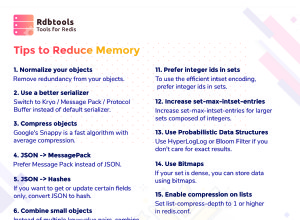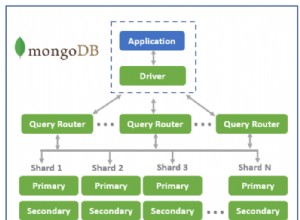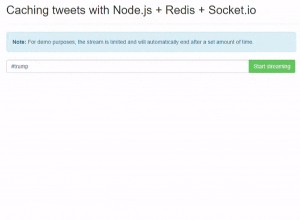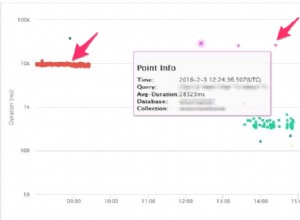Une API "fortement typée" disponible sur le client C# Redis de Service Stack pour que toutes les opérations de valeur Redis s'appliquent à n'importe quel type C#
API client générique fortement typé #
Vous trouverez ci-dessous l'API fortement typée à laquelle vous avez accès après avoir appelé IRedisClient.As<T>() par exemple :
using (var redisClient = new RedisClient())
{
var redis = redisClient.As<MyPocoType>();
}
La variable redis contient désormais un client générique fortement typé qui permet aux opérations de valeur Redis de s'appliquer à MyPocoType . L'interface ci-dessous liste toutes les opérations disponibles :
public interface IRedisTypedClient<T>
: IBasicPersistenceProvider<T>
{
IHasNamed<IRedisList<T>> Lists { get; set; }
IHasNamed<IRedisSet<T>> Sets { get; set; }
IHasNamed<IRedisSortedSet<T>> SortedSets { get; set; }
IRedisHash<TKey, T> GetHash<TKey>(string hashId);
IRedisTypedTransaction<T> CreateTransaction();
IDisposable AcquireLock();
IDisposable AcquireLock(TimeSpan timeOut);
int Db { get; set; }
List<string> GetAllKeys();
T this[string key] { get; set; }
string SequenceKey { get; set; }
void SetSequence(int value);
int GetNextSequence();
RedisKeyType GetEntryType(string key);
string GetRandomKey();
void SetEntry(string key, T value);
void SetEntry(string key, T value, TimeSpan expireIn);
bool SetEntryIfNotExists(string key, T value);
T GetValue(string key);
T GetAndSetValue(string key, T value);
bool ContainsKey(string key);
bool RemoveEntry(string key);
bool RemoveEntry(params string[] args);
bool RemoveEntry(params IHasStringId[] entities);
int IncrementValue(string key);
int IncrementValueBy(string key, int count);
int DecrementValue(string key);
int DecrementValueBy(string key, int count);
bool ExpireEntryIn(string key, TimeSpan expiresAt);
bool ExpireEntryAt(string key, DateTime dateTime);
TimeSpan GetTimeToLive(string key);
void Save();
void SaveAsync();
void FlushDb();
void FlushAll();
T[] SearchKeys(string pattern);
List<T> GetValues(List<string> keys);
List<T> GetSortedEntryValues(IRedisSet<T> fromSet, int startingFrom, int endingAt);
HashSet<T> GetAllItemsFromSet(IRedisSet<T> fromSet);
void AddItemToSet(IRedisSet<T> toSet, T item);
void RemoveItemFromSet(IRedisSet<T> fromSet, T item);
T PopItemFromSet(IRedisSet<T> fromSet);
void MoveBetweenSets(IRedisSet<T> fromSet, IRedisSet<T> toSet, T item);
int GetSetCount(IRedisSet<T> set);
bool SetContainsItem(IRedisSet<T> set, T item);
HashSet<T> GetIntersectFromSets(params IRedisSet<T>[] sets);
void StoreIntersectFromSets(IRedisSet<T> intoSet, params IRedisSet<T>[] sets);
HashSet<T> GetUnionFromSets(params IRedisSet<T>[] sets);
void StoreUnionFromSets(IRedisSet<T> intoSet, params IRedisSet<T>[] sets);
HashSet<T> GetDifferencesFromSet(IRedisSet<T> fromSet, params IRedisSet<T>[] withSets);
void StoreDifferencesFromSet(IRedisSet<T> intoSet, IRedisSet<T> fromSet, params IRedisSet<T>[] withSets);
T GetRandomItemFromSet(IRedisSet<T> fromSet);
List<T> GetAllItemsFromList(IRedisList<T> fromList);
List<T> GetRangeFromList(IRedisList<T> fromList, int startingFrom, int endingAt);
List<T> SortList(IRedisList<T> fromList, int startingFrom, int endingAt);
void AddItemToList(IRedisList<T> fromList, T value);
void PrependItemToList(IRedisList<T> fromList, T value);
T RemoveStartFromList(IRedisList<T> fromList);
T BlockingRemoveStartFromList(IRedisList<T> fromList, TimeSpan? timeOut);
T RemoveEndFromList(IRedisList<T> fromList);
void RemoveAllFromList(IRedisList<T> fromList);
void TrimList(IRedisList<T> fromList, int keepStartingFrom, int keepEndingAt);
int RemoveItemFromList(IRedisList<T> fromList, T value);
int RemoveItemFromList(IRedisList<T> fromList, T value, int noOfMatches);
int GetListCount(IRedisList<T> fromList);
T GetItemFromList(IRedisList<T> fromList, int listIndex);
void SetItemInList(IRedisList<T> toList, int listIndex, T value);
//Queue operations
void EnqueueItemOnList(IRedisList<T> fromList, T item);
T DequeueItemFromList(IRedisList<T> fromList);
T BlockingDequeueItemFromList(IRedisList<T> fromList, TimeSpan? timeOut);
//Stack operations
void PushItemToList(IRedisList<T> fromList, T item);
T PopItemFromList(IRedisList<T> fromList);
T BlockingPopItemFromList(IRedisList<T> fromList, TimeSpan? timeOut);
T PopAndPushItemBetweenLists(IRedisList<T> fromList, IRedisList<T> toList);
void AddItemToSortedSet(IRedisSortedSet<T> toSet, T value);
void AddItemToSortedSet(IRedisSortedSet<T> toSet, T value, double score);
bool RemoveItemFromSortedSet(IRedisSortedSet<T> fromSet, T value);
T PopItemWithLowestScoreFromSortedSet(IRedisSortedSet<T> fromSet);
T PopItemWithHighestScoreFromSortedSet(IRedisSortedSet<T> fromSet);
bool SortedSetContainsItem(IRedisSortedSet<T> set, T value);
double IncrementItemInSortedSet(IRedisSortedSet<T> set, T value, double incrementBy);
int GetItemIndexInSortedSet(IRedisSortedSet<T> set, T value);
int GetItemIndexInSortedSetDesc(IRedisSortedSet<T> set, T value);
List<T> GetAllItemsFromSortedSet(IRedisSortedSet<T> set);
List<T> GetAllItemsFromSortedSetDesc(IRedisSortedSet<T> set);
List<T> GetRangeFromSortedSet(IRedisSortedSet<T> set, int fromRank, int toRank);
List<T> GetRangeFromSortedSetDesc(IRedisSortedSet<T> set, int fromRank, int toRank);
IDictionary<T, double> GetAllWithScoresFromSortedSet(IRedisSortedSet<T> set);
IDictionary<T, double> GetRangeWithScoresFromSortedSet(IRedisSortedSet<T> set, int fromRank, int toRank);
IDictionary<T, double> GetRangeWithScoresFromSortedSetDesc(IRedisSortedSet<T> set, int fromRank, int toRank);
List<T> GetRangeFromSortedSetByLowestScore(IRedisSortedSet<T> set, string fromStringScore, string toStringScore);
List<T> GetRangeFromSortedSetByLowestScore(IRedisSortedSet<T> set, string fromStringScore, string toStringScore, int? skip, int? take);
List<T> GetRangeFromSortedSetByLowestScore(IRedisSortedSet<T> set, double fromScore, double toScore);
List<T> GetRangeFromSortedSetByLowestScore(IRedisSortedSet<T> set, double fromScore, double toScore, int? skip, int? take);
IDictionary<T, double> GetRangeWithScoresFromSortedSetByLowestScore(IRedisSortedSet<T> set, string fromStringScore, string toStringScore);
IDictionary<T, double> GetRangeWithScoresFromSortedSetByLowestScore(IRedisSortedSet<T> set, string fromStringScore, string toStringScore, int? skip, int? take);
IDictionary<T, double> GetRangeWithScoresFromSortedSetByLowestScore(IRedisSortedSet<T> set, double fromScore, double toScore);
IDictionary<T, double> GetRangeWithScoresFromSortedSetByLowestScore(IRedisSortedSet<T> set, double fromScore, double toScore, int? skip, int? take);
List<T> GetRangeFromSortedSetByHighestScore(IRedisSortedSet<T> set, string fromStringScore, string toStringScore);
List<T> GetRangeFromSortedSetByHighestScore(IRedisSortedSet<T> set, string fromStringScore, string toStringScore, int? skip, int? take);
List<T> GetRangeFromSortedSetByHighestScore(IRedisSortedSet<T> set, double fromScore, double toScore);
List<T> GetRangeFromSortedSetByHighestScore(IRedisSortedSet<T> set, double fromScore, double toScore, int? skip, int? take);
IDictionary<T, double> GetRangeWithScoresFromSortedSetByHighestScore(IRedisSortedSet<T> set, string fromStringScore, string toStringScore);
IDictionary<T, double> GetRangeWithScoresFromSortedSetByHighestScore(IRedisSortedSet<T> set, string fromStringScore, string toStringScore, int? skip, int? take);
IDictionary<T, double> GetRangeWithScoresFromSortedSetByHighestScore(IRedisSortedSet<T> set, double fromScore, double toScore);
IDictionary<T, double> GetRangeWithScoresFromSortedSetByHighestScore(IRedisSortedSet<T> set, double fromScore, double toScore, int? skip, int? take);
int RemoveRangeFromSortedSet(IRedisSortedSet<T> set, int minRank, int maxRank);
int RemoveRangeFromSortedSetByScore(IRedisSortedSet<T> set, double fromScore, double toScore);
int GetSortedSetCount(IRedisSortedSet<T> set);
double GetItemScoreInSortedSet(IRedisSortedSet<T> set, T value);
int StoreIntersectFromSortedSets(IRedisSortedSet<T> intoSetId, params IRedisSortedSet<T>[] setIds);
int StoreUnionFromSortedSets(IRedisSortedSet<T> intoSetId, params IRedisSortedSet<T>[] setIds);
bool HashContainsEntry<TKey>(IRedisHash<TKey, T> hash, TKey key);
bool SetEntryInHash<TKey>(IRedisHash<TKey, T> hash, TKey key, T value);
bool SetEntryInHashIfNotExists<TKey>(IRedisHash<TKey, T> hash, TKey key, T value);
void SetRangeInHash<TKey>(IRedisHash<TKey, T> hash, IEnumerable<KeyValuePair<TKey, T>> keyValuePairs);
T GetValueFromHash<TKey>(IRedisHash<TKey, T> hash, TKey key);
bool RemoveEntryFromHash<TKey>(IRedisHash<TKey, T> hash, TKey key);
int GetHashCount<TKey>(IRedisHash<TKey, T> hash);
List<TKey> GetHashKeys<TKey>(IRedisHash<TKey, T> hash);
List<T> GetHashValues<TKey>(IRedisHash<TKey, T> hash);
Dictionary<TKey, T> GetAllEntriesFromHash<TKey>(IRedisHash<TKey, T> hash);
}
Interface commune d'accès aux données #
En incluant les méthodes ci-dessus, le client générique implémente également des opérations d'accès aux données communes non spécifiques à Redis qui peuvent être facilement implémentées par d'autres fournisseurs de persistance des données si vous souhaitez changer de fournisseur à l'avenir.
public interface IBasicPersistenceProvider<T>
: IDisposable
{
T GetById(string id);
IList<T> GetByIds(ICollection<string> ids);
IList<T> GetAll();
T Store(T entity);
void StoreAll(IEnumerable<T> entities);
void Delete(T entity);
void DeleteById(string id);
void DeleteByIds(ICollection<string> ids);
void DeleteAll();
}
En règle générale, si vous n'avez que des besoins de persistance de base, je vous recommande de développer avec l'API d'accès aux données communes ci-dessus, car il est plus facile pour d'autres fournisseurs de persistance de l'implémenter et augmente la probabilité que votre bibliothèque puisse être réutilisée telle quelle pour persister contre d'autres magasins de données. c'est-à-dire contre un SGBDR avec OrmLite, etc.




